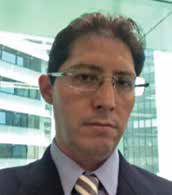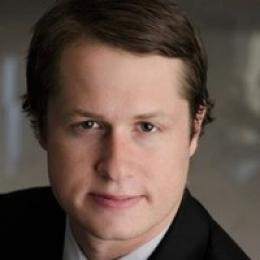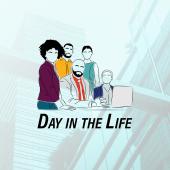
Adam Walters
ASSISTANT GENERAL COUNSEL, ASIA PACIFIC
FOR FIRST SOLAR INC.
“It takes a different mentality to be a successful in-house lawyer than to be a private practice lawyer,” says Adam Walters, assistant general counsel, Asia Pacific for First Solar Inc. It also means being on call 24 hours a day, seven days a week. “The idea that you go in-house to get a cushy job with great work-life balance is not something I have experienced.”
Walters, who was the second employee in the Australian office, likes to say his shortest commute is seven and a half hours – the flight time between Sydney and the closest regional office in Jakarta, Indonesia. Since he joined First Solar in July 2011, his responsibilities have ballooned. A few years ago, the company had operations principally in Europe or North America. Now it is growing all the time. Walters estimates they have operations in 20 countries and conduct sales in 40 to 50 countries.
First Solar, which was founded in 1999, is a vertically integrated solar solutions provider that manufactures solar photovoltaic modules and other equipment, and develops, constructs, operates and maintains large-scale photovoltaic power plants. Based in Tempe, Arizona, the company is considered an industry leader with revenue of $3.3 billion in 2013.
The breakneck expansion means that Walters is constantly on the move to help the company grow. Walters and his direct reports support First Solar’s businesses in Asia Pacific. When he joined, that basically meant Australia and India, which is no longer a part of his region because First Solar now has a large office in New Delhi where local in-house lawyers handle its needs. The company’s main Asia Pacific hubs are Tokyo and Sydney, with sales offices in Beijing, Bangkok, Jakarta and Kuala Lumpur. The APAC region is always looking at new markets as well, including the Philippines, Samoa, Guam and Vietnam. As a result, Walters is on the ground conducting due diligence wherever First Solar opens a new market. “Every single country is very different legally and culturally. I think it’s very dangerous to make generalizations because every country is different, so it’s always challenging,” he explains. He is currently spending a lot of time in Japan, where First Solar is developing a pipeline of solar projects.
A lot of that time is spent interviewing, engaging and managing local counsel. As a specialist in cross-border project agreements, Walters relies on local counsel to navigate local laws and customs. It is also difficult to impart the First Solar and American corporate cultures, policies and business practices on local lawyers. Even in Australia, where many assume it is similar to the United States, Walters has found different attitudes. “People tend to make the mistake, that, oh, it’s an English-speaking country, so it must do business the same way. No. It makes it easier to communicate, but culturally it’s quite different and doing business here is quite different.”
For a company that develops and constructs large solar power plants and sells equipment all over the world, First Solar’s legal department is relatively small. There are a small number US-based specialist lawyers, some of whom also wear business hats — like an IP lawyer and an environmental, health and safety lawyer. Some divisions, such as supply chain, EPC and O&M, also have dedicated US-based lawyers. Then there are five or six customer-facing transactional lawyers with regional responsibility, including Walters. US-based transactional lawyers report to a stateside general counsel, and most of the international transactional lawyers report to a Europe-based general counsel. Leading the legal department is Executive Vice President and General Counsel Paul Kaleta, who joined the company in March 2014. Kaleta, an energy industry veteran, recently of NV Energy, who knows a thing or two about scaling a massive operation from his time as general counsel for Koch Industries, is addressing efficiencies in the legal department.
As First Solar grows, old challenges diminish and others take their place. Walters used to have to fight for support and resources to grow his region. He was, in time, able to build up local expertise to address the growing pains. He also had to remain humble during transactions in the region. “In the United States, we’re a very big solar company. We have a lot of bargaining power with our subcontractors, with our supply chain. In other countries, that doesn’t mean a whole lot, so our bargaining power is different,” Walters says.
The billable hour is one thing he always tries to negotiate with outside firms. Although it’s still the dominant model, he likes to see fixed fee quotes or fee caps from firms. He says he has worked with 25 firms across the region and almost all of them have been happy to oblige.
His negotiating skills were honed over a lifetime of debate, in classrooms and courtrooms, and experiences across the United States and in Australia.
Walters grew up in a small town called Evergreen, outside Denver, Colorado. The son of one of the town’s only pediatricians and a part-time teacher, he thought he was initially destined to become a lawyer due to his argumentative nature and love of serious, political topics. But he also loved animals and grew up with dogs, cats and a tiger salamander (he wasn’t allowed to have snakes). In high school he moved to Houston, Texas, where his love of animals led him to study biology. He returned to Colorado for college, going to CU-Boulder to study the foraging behavior of pit vipers under the prominent herpetologist, David Chiszar. He majored in psychology, with a focus on animal behavior, and became a fourth generation graduate of CU-Boulder. During the summer, he worked for the US Forest Service doing amphibian surveys in the Colorado Rockies.
Expecting to become an animal scientist, Walters enrolled in a doctoral program in animal behavior at the University of Texas. It was there, while also teaching statistics to undergraduate students, that he realized he was not in love with academia. Options were limited. He liked research and working with animals much more than teaching. In addition to taking in pythons and iguanas that had overgrown their owner’s terrariums, he cared for a large number of animals in the reptile department of the Dallas Zoo when he was a research technician there. He became concerned about illegal trade of wildlife, particularly reptiles and tarantulas, which was rapidly growing in the early 1990s. Then it clicked: He realized wanted to prosecute illegal trade in wildlife.
Walters spent a year at Duke University School of Law before transferring to the University of California’s Boalt School of Law. Always set on public service, he received the 1998 Judge D.L. Jensen Public Service Scholarship and worked in an externship at the San Francisco District Attorney’s Office in the homicide unit. After graduating in the top 20 percent of his class in 1999, Walters moved to Seattle, Washington, to pursue a prosecution career in King County.
He then practiced immigration litigation with Edward & Associates PS before moving on to a boutique firm that primarily serviced the Pacific Northwest’s vibrant IT industry. There, he built up more business-oriented experience. After five years, always wanting to live abroad, he went “down under.”
In order to immigrate to Australia, Walters had to obtain his local practicing certificate (law license) from the law society. Like some common law countries, Australia has two types of lawyers: A barrister specializes in courtroom advocacy, legal writings and expert legal opinions, while a solicitor has more direct access to clients and does transactional legal work. Walters was admitted as a solicitor of the Supreme Court of New South Wales, Australia, in 2004.
He found the firm culture in Australia much more conservative than in the United States. The Australian firms were more hierarchical and paternalistic, indifferent about origination among associates and only showed partners on their websites. More concerned with losing associates to a firm in Hong Kong or the Middle East, the Australian firms had a rigid hierarchy that was a culture shock to Walters. When he first started practicing in 2005, there were a handful of very large firms and several mid-tier firms, but boutique firms were rare. That has changed substantially over the last decade. He found a position in a small construction firm and built up more experience before moving on to a large firm in Melbourne.
A two-year stint, from 2008-2010, with Stoel Rives LLP in Seattle, Washington, gave Walters his most enjoyable work to date: renewable energy projects, and in particular, solar power. He says: “I am very thankful to Alan Merkle and Howard Susman of Stoel Rives for giving me my start in renewable energy.” Merkle, who has long been known as one of the top wind industry lawyers in the country and who was at the time the chairman of Stoel Rives, hired Walters. Susman, who has built one of the top solar practices in the United States out of his office in San Diego, gave Walters his start in solar. At the same time, Walters was hired a new client of Susman’s, California-headquartered SunPower Corporation was developing some of the first utility-scale power plants in North America. Walters was fortunate to advise and represent the company on a number of their early projects. He knew then that he wanted to go in-house with a company like SunPower, believing that the solar industry had a promising future. He went on to act for a number of other solar companies.
When he returned to his prior Australian firm Maddocks in July 2010, Walters had high hopes for utility-scale renewable energy in Australia. He continued advising SunPower and other solar and wind industry clients, while at the same time pursuing in-house positions. He eventually signed with First Solar in 2011, in time to advise the company on the construction of the first utility-scale solar power plant in Australia, the 10 MW Greenough River Solar Farm, near Geraldton, Western Australia.
The Australian in-house community has evolved a lot since he first came to the country in 2004. Companies are finding more value in hiring in-house lawyers and ceasing to send all legal work to top-tier firms. “Sydney is a regional hub with a large and talented legal community that have the ability to cover multiple countries in the region, and those roles are highly sought-after and very competitive,” Walters says. He never forgets how lucky he is to be doing something he enjoys and that helps the world function in a responsible manner.
Walters is someone who follows his passions: from reptiles to public service to clean energy. One wonders where he’ll be in 10 years. “I tend not to look more than two or three years in the future,” he answers, “You never know what the future holds.”
Getting to Know… Adam Walters
WHAT IS THE BIGGEST MISPERCEPTION ABOUT IN-HOUSE COUNSEL?
In my region, because in-house counsel is a relatively new position in the legal industry in many countries, it’s the perception of competence. There is a bit of stigma in many countries in Asia about in-house counsel. They view them to be less skilled or less competent than lawyers who work in large law firms.
FROM AN INTERNATIONAL STANDPOINT, WHAT DEVELOPMENTS POSE THE BIGGEST CHALLENGES FOR YOU?
I wouldn’t call it a development, but certainly in my region, corruption is a major challenge for my company and my practice. It’s endemic in many countries, not just limited to Asia, but within Asia it’s seen as the cost of doing business in a lot of countries. Training our business development people and making them understand what our standards are as an American multinational in respect of that is a challenge.
IN YOUR LITTLE SPARE TIME, WHAT DO YOU LIKE TO DO?
I really enjoy traveling, though these days most of my travel is business travel. I used to really enjoy sports, tournament poker and fishing, but I don’t have time for those pursuits anymore.
WHAT ARE YOUR HOBBIES?
I don’t have time for hobbies. I just got married so I spend any spare time with my wife and son. My son loves the beach so we go to the beach a lot.
HOW ARE YOU ABLE TO STAY ON TASK ALL THE TIME, WITHOUT BEING BURNED OUT?
I am able to stay on task because I genuinely enjoy my job. It is always intellectually challenging and never boring. Being a regional counsel means that I am not chained to a desk everyday, as I was in private practice. That keeps things interesting. It’s a demanding role so I can’t say that I never get burned out, but I tend to rebound quickly. I think a lot of that has to do with enjoying the people with whom I work and having the autonomy to handle my region and support my internal clients the way I see fit, and the flexibility to make adjustments when I see that things can be done better or more efficiently. At this stage I can’t imagine going back to private practice.




